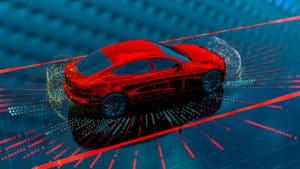
Revving Up the Future: Quantum Computing Takes the Wheel in Automotive Innovation
The automotive industry stands at the precipice of a revolution. Electric vehicles are gaining traction, autonomous driving promises to reshape transportation, and new materials are constantly being explored. At the heart of this transformation lies a powerful, nascent technology: quantum computing.
Unlike traditional computers that rely on bits (0s or 1s), quantum computers harness the principles of quantum mechanics to utilize qubits. Qubits can exist in a superposition of states (both 0 and 1 simultaneously), allowing them to perform calculations exponentially faster than classical computers for specific problems. This unlocks a treasure trove of possibilities for the automotive industry, from optimizing supply chains to designing next-generation batteries.
Under the Hood of Quantum Computing Advancements
Significant strides are being made in the field of quantum computing. Here are some of the latest developments:
- Hardware advancements: Companies like IBM (IBM), Rigetti Computing (RGTI), and IonQ (IONQ) are pushing the boundaries of qubit count and error correction rates. IBM recently announced its Osprey quantum processor with 433 qubits, while Rigetti is developing a scalable architecture using superconducting qubits.
- Software development: Quantum algorithms are being refined to tackle specific problems in various industries. Companies like Xanadu (XANU) and Honeywell (HON) are building user-friendly software platforms for quantum computing.
- Cloud access: Cloud service providers like Amazon Web Services (AMZN) and Microsoft (MSFT) are offering access to quantum computing resources through their platforms, making the technology more accessible to a wider range of companies.

Quantum Computing in the Driver’s Seat: Applications in the Automotive Industry
The potential applications of quantum computing in the automotive industry are vast. Here are some key areas where breakthroughs are being made:
- Battery development: Quantum simulations can analyze the behavior of materials at the atomic level, leading to the creation of next-generation batteries with higher capacity, faster charging times, and improved safety. Ford (F) is collaborating with Quantinuum (QTUM) to use quantum computing for lithium-ion battery research.
- Materials science: Quantum computers can design lighter, stronger, and more efficient materials for vehicles. This could lead to lighter cars with improved fuel efficiency or longer range for electric vehicles. Stellantis (STLA) has partnered with Google (GOOG) to explore the use of quantum computing for materials discovery.
- Supply chain optimization: Complexities in automotive supply chains can be streamlined using quantum algorithms. This can improve efficiency, reduce costs, and minimize disruptions. Volkswagen Group (VOWG_DE) is exploring the use of quantum computing for logistics optimization with Honeywell.
- Autonomous vehicle development: Quantum computing can analyze vast amounts of sensor data in real-time, enabling faster processing and more accurate decision-making by autonomous vehicles. Companies like Daimler (DAI) and BMW (BMW) are collaborating with startups like Zapata Computing (ZP) to leverage quantum computing for autonomous driving.
- Traffic management: Quantum simulations can predict traffic patterns with greater accuracy, leading to intelligent transportation systems that improve traffic flow, reduce congestion, and enhance road safety. Toyota Motor Corporation (TM) is researching the use of quantum computing for traffic flow optimization.
Companies Leading the Charge
Several companies, both established and emerging, are at the forefront of this exciting intersection of quantum computing and automotive innovation. Here’s a closer look at some key players:
- Automotive OEMs:
- Ford (F): In collaboration with Quantinuum, Ford is using quantum computing to accelerate battery development for electric vehicles.
- Stellantis (STLA): Partnering with Google, Stellantis is exploring the use of quantum computing for materials discovery to create lighter and more efficient car components.
- Volkswagen Group (VOWG_DE): Volkswagen is working with Honeywell to leverage quantum computing for optimizing logistics within their complex supply chain.
- Daimler (DAI): Daimler is collaborating with Zapata Computing to explore the potential of quantum computing for decision-making in autonomous vehicles.
- Toyota Motor Corporation (TM): Toyota is researching the use of quantum computing for traffic flow optimization, aiming to improve traffic management and road safety.
- Semiconductor companies:
- Intel (INTC): Intel is actively researching and developing its own quantum computing hardware and software solutions.
- AMD (AMD): While not a direct player in quantum computing hardware, AMD is developing processors specifically designed to work with quantum computers.
- Nvidia (NVDA): Similar to AMD, Nvidia is developing graphics processing units (GPUs) optimized for quantum computing applications.
There are countless other companies from around the world developing quantum capabilities to revolutionize the automotive and transportation industries. KES Systems is proud to work with many of these and will continue to support the innovation needed to progress.